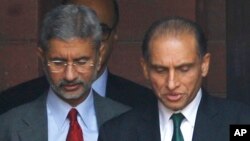India’s top diplomat pressed his Pakistani counterpart on Tuesday to acknowledge and combat terrorism aimed at the Indian state, and to make "visible progress" on investigating violence.
"Terrorist groups based in Pakistan must not be allowed to operate with impunity," Indian Foreign Secretary Subrahmanyam Jaishankar said in a statement, following a meeting Tuesday with Pakistan’s Aizaz Ahmad Chaudhry.
The two men met here, on the sidelines of a regional conference on Afghanistan, to discuss terrorism, the disputed area of Kashmir and other issues troubling their respective countries’ relationship.
The high-level meeting, originally scheduled for mid-January, was delayed after an armed militant attack on an Indian air base earlier that month left seven Indian security dead.
New Delhi has blamed the Pakistan-based Jaish-e-Mohammad militant group for the strike on the Pathankot air base. It also has accused Islamabad of doing too little to bring to justice perpetrators of the 2008 terror attacks in Mumbai in which 166 people died.
Jaishankar "emphasized the need for early and visible progress on the Pathankot terrorist attack investigation as well as the Mumbai case trial in Pakistan," according to a statement.
Pakistan's anti-terrorism courts produce extremely low conviction rates and need reform, according to a new report from the U.S. Institute of Peace, an independent, nonpartisan, federally funded organization.
A statement from the Pakistani High Commission in Delhi said Chaudhry had emphasized Kashmir remains the core issue requiring a just solution. The divided Himalayan territory has been a source of contention – and the trigger for two of the nuclear-armed rivals’ three wars – for decades.
Suspected spy case
The issue of a suspected Indian spy in Pakistani custody also figured in the discussions, with New Delhi demanding consular access to a man captured by Pakistani authorities in Baluchistan.
New Delhi said Kulbhushan Jadhav, a former naval officer, was abducted and taken to Pakistan. Islamabad expressed concern over India’s intelligence agency in what it called “subversive activities” in Baluchistan and Karachi.
Efforts to resume talks between the two countries failed in the past year. In August, high-level discussions were called off after both sides exchanged barbs over the agenda.
A surprise stopover by Indian Prime Minister Narendra Modi in Pakistan in December led to a thaw in relations and the countries put the process of dialogue back on track, but that, too, was derailed by the Pathankot air base attack.
A South Asia expert at New Delhi’s Institute for Defense and Analysis, Sukh Deo Muni, said Tuesday’s meeting signified that the two sides remain committed to holding talks. The analyst said he was uncertain whether the dialogue represented a meaningful step.
“It’s all right, they will continue to talk, but without any meaning,” he said of Pakistani and Indian officials. “The direction is clear, the destination is not clear.”












